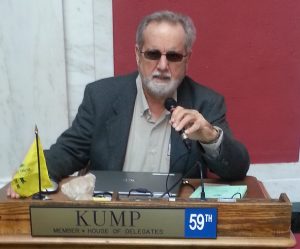Two supporters of House of Delegates District 59 candidate Larry Kump will ask the West Virginia Supreme Court today to decide whether Kump’s Republican primary opponent Tally Reed actually resides in the district.

Larry Kump
Reed’s announcement earlier this year that she was running for House of Delegates in the 59th district triggered a bipartisan uproar because her primary residence is in Berkeley Springs in the 58th district – represented by House Majority Leader Daryl Cowles (R-Morgan) — and not in the 59th district.
Kump told WRNR’s Eastern Panhandle Talk with Rob Mario and David Welch this morning that the two petitioners who will go before the Supreme Court later today are supporters of his campaign.
“One is from Berkeley County and one is from Morgan County,” Kump said.
Do we know who they are? asked Welch.
“I know who they are,” Kump said.
Can you tell us? asked Welch.
“I don’t think it’s proper for me – I can tell you – one is Berkeley County. One is in Morgan County.”
Are they supporters of your candidacy? asked Welch.
“Yes they are,” Kump said.
Are you personally motivated to demonstrate that she does not live in the district so as to remove a substantial primary opponent? Welch asked.
“I want the facts to be adjudicated,” Kump said. “Regardless of my candidacy, it’s important to the citizens of West Virginia and the citizens of District 59 that there be a legitimate candidate on the ballot, regardless of whether I am in the race or not.”
Kump said he was “very sympathetic on most issues” to the Liberty Caucus in the House of Delegates.
Is it possible that this is about something bigger than just the residency – could it be about the Liberty Caucus group challenging the establishment Republicans? Welch asked.
“It’s about the residency,” Kump said. “The outrage that I have heard is that it’s about the residency – about the rule of law.”
“When she first filed to run in the 59th district days before the end of the deadline, at first I didn’t realize who she was and who she was connected with,” Kump said. “I knew the Reeds lived in Berkeley Springs outside of the district. When I found out it was here, I had an ‘O my gosh’ moment. I knew the Reeds had very deep pockets and could certainly outspend me. And I thought – well, I’ll just move ahead on the issues.”
“Then more and more evidence came up that she did not actually live in the district, but that it was a subterfuge. That was a concern to me, but I thought – well, people who complained to me about the issue asked me – what am I going to do about it? And I said – that’s an issue for the Secretary of State to determine.”
“People started writing to the Secretary of State – more than I can count. I know there was a good many, because I received copies of the letters they sent to the Secretary of State. It’s my understanding that the Secretary of State has the authority to investigate these situations. Not only did he not investigate, he did not respond to these individuals.”
“It wasn’t until I was talking with a local newspaper reporter, he said – I’ll ask. The Secretary of State’s office said essentially that they just take the word of the people who are filing.”
“That surprised and disappointed me. I couldn’t understand why the Secretary of State – Mac Warner – would not investigate an issue of residential legitimacy.”
“Moving forward, there was a debate between the candidates sponsored by another radio station – an hour debate scheduled a month or so in advance that Ms. Reed and I both agreed to. As I was getting ready to walk out the door to go to the debate, I got a call from the news director saying – it’s not going to happen, she’s tied up and can’t make it.”
“A couple of days later, we had the Lincoln Dinner in Berkeley County – which is a must show for candidates – and she did not show for that either.”
“I learned not too long after that it was announced that she was not going to be making any more public appearances or media appearances. There seems to be a resurgence of concern about her residency. And of course today there is going to be a petition filed with the West Virginia Supreme Court.”
